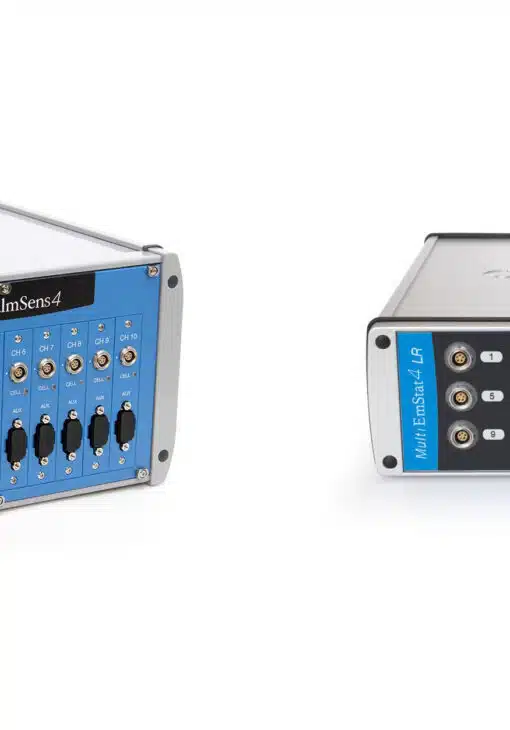Multi-channel potentiostat
Do you want to perform several electrochemical measurements simultaneously? Then you need a multi-channel potentiostat. A multi-channel potentiostat allows you to perform multiple experiments at the same time.
What is a multi-channel potentiostat used for?
Multi-channel potentiostats are mostly used in electrochemistry in complex experimental situations where many experiments are running in parallel, to be able to draw a conclusion from a certain experiment or research.
- For example, you may need to perform multiple measurements with a long duration, e.g. charge-discharge curves for batteries.
- Also, you may be quantifying multiple analytes with different sensors in a sample solution, e.g. water quality monitoring.
- Finally, you may want to be able to examine multiple samples simultaneously so that you can make rapid progress, e.g. organic coatings on metal alloys for corrosion protection.
Applications for the use of multichannel potentiostats include combinatorial testing, coating analysis, microbial fuel cells, continuous corrosion monitoring, electrode array monitoring, sensor arrays and large-scale supercapacitor for battery evaluation. Feel free to check our literature database for more examples.
Which multi-channel potentiostats does PalmSens provide?
PalmSens has developed two multi-channel potentiostats which both have a galvanostat mode and are capable of FRA/EIS: the MultiPalmSens4 and the MultiEmstat4.
Our multi-channel instruments can controlled by our own MultiTrace software or by your own custom developed software program.
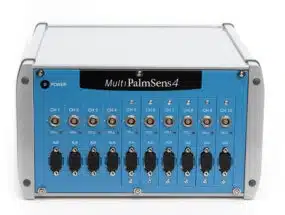
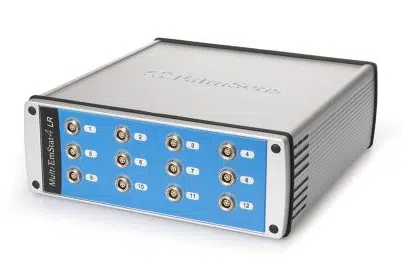
What differences are there between the MultiPalmSens4 and the MultiEmstat4?
Besides the similarities already mentioned, there are also some differences between our multichannel tools.
- Our Flagship, the MultiPalmSens4 supports a higher potential range of 10 V and Electrochemical Impedance Spectroscopy (EIS) up to 1 MHz, whereas the MultiEmStat4 supports a potential range up to 6 V and for EIS frequencies up to 200 kHZ. The MultiEmStat4 High Range can handle up to 200 mA per channel, which is the highest current range PalmSens instruments offer.
- An important difference is that the MultiPalmSens4 has an auxiliary port and a larger internal memory.
- Finally, the MultiPalmSens4 is customized for you. You can have it completely configured to your own wishes. This can easily be done online on the product page. With the MultiEmStat4 you can also choose from a few simple product variations. However, the choice here is less extensive.
You can see all the other differences below in the comparison table:
MultiPalmSens4 |
MultiEmStat4 |
|
| Applied potential accuracy | ≤ 0.1% ±1 mV offset | ≤ 0.2% ±1 mV offset |
| Current accuracy | ≤ 0.1 % (at Full Scale Range) | 0.009% of CR (92 fA on 1 nA range) |
| Dc-potential range | ±5 V or ± 10 V | ±3V or ±6 V |
| Maximum current | ±30 mA | ±30 mA or ±200 mA |
| Compliance voltage | ±10 V | ±5V or ±8 V |
| Galvanostat mode | Yes | Yes |
| FRA / EIS mode | Yes | Yes |
| Auxiliary port | Yes | No |
| Communication | USB | USB (type B) |
| Power | Battery, USB | USB |
| Internal storage | 8 GB | 500 MB up to 16 million datapoints |
| Measured dc-potential resolution | 78.13 μV at ±10 V 7.813 μV at ±1 V 0.7813 μV at ±0.1 V |
193 µV (gain 1), 96,5 µV (gain 2), 38,5 µV (gain 5), 19.3 µV (gain 10), 9,65 µV (gain 20), 96 µV (gain 1), 48 µV (gain 2), 19,2 µV (gain 5), 9,6 µV (gain 10), 4,8 µV (gain 20) |
| Applied dc-potential resolution | 76.3 µV | 100 µV or 183 µV |
| Maximum scan rate | 500 V/s with 10 mV step | |
| Weight | 4kg | 3kg |
| Channels | 4 up to 10 | 4, 8, 12 |
| Dimensions | 15 x 25 x 25 cm | 21,2 x 22,1 x 7,7 cm |
| Current ranges | 100 pA to 10 mA (9 ranges) | 1 nA to 10 mA (7 ranges), 100nA to 100 mA (8 ranges) |
| Frequency range | 10 μHz to 1 MHz (or 10 μHz to 100 kHz) | 10 μHz to 200 kHz) |
| Current ranges galvanostat | 1 nA to 10 mA (8 ranges) | 10 nA (LR), 1uA, 100uA, 10 mA, 100 mA (HR) (4 ranges) |
| Ac-amplitude range | 1 mV to 0.25 V rms, or 0.7 V p-p | 1 mV to 900 mV rms, or 2,5 V p-p |
| Bandwidth | 1 MHz | 10 kHz default, or 500 kHz for EIS and fast CA/CP |
| Measured current resolution | 0.005 % of current range (5 fA on 100 pA range) 0.0025% of 10 mA range |
≤ 0.2% at Full Scale Range |
| Applied dc-current resolution Galvanostat | 0,005% of applied current range | 0,01% or 0,0183% of applied current range |
| Electrometer amplifier input | > 1 TΩ // 10 pF | > 1 TΩ // 10 pF |
Galvanostat |
||
| Galvanostat mode | Yes | Yes |
| Applied dc-current resolution Galvanostat | 0,005% of applied current range | 0,01% or 0,0183% of applied current range |
| Current ranges galvanostat | 1 nA to 10 mA (8 ranges) | 10 nA (LR), 1uA, 100uA, 10 mA, 100 mA (HR) (4 ranges) |
| Measured dc-potential resolution | 78.13 μV at ±10 V 7.813 μV at ±1 V 0.7813 μV at ±0,1 V |
193 µV (gain 1), 96,5 µV (gain 2), 38,5 µV (gain 5), 19.3 µV (gain 10), 9,65 µV (gain 20), 96 µV (gain 1), 48 µV (gain 2), 19,2 µV (gain 5), 9,6 µV (gain 10), 4,8 µV (gain 20) |
FRA / EIS |
||
| FRA / EIS mode | Yes | Yes |
| Frequency range | 10 μHz to 1 MHz (or 10 μHz to 100 kHz) | 10 μHz to 200 kHz) |
| Ac-amplitude range | 1 mV to 0.25 V rms, or 0.7 V p-p | 1 mV to 900 mV rms, or 2,5 V p-p |
Electrometer |
||
| Electrometer amplifier input | > 1 TΩ // 10 pF | > 1 TΩ // 10 pF |
| Bandwidth | 1 MHz | 10 kHz default, or 500 kHz for EIS and fast CA/CP |
Other |
||
| Communication | USB | USB (type B) |
| Internal storage | 8 GB | 500 MB up to 16 million datapoints |
| Battery life | – | – |
| Auxiliary port | Yes | No |
| Power | Battery, USB | USB |
| Dimensions | 15 x 25 x 25 cm | 21,2 x 22,1 x 7,7 cm |
| Weight | 4kg | 3kg |
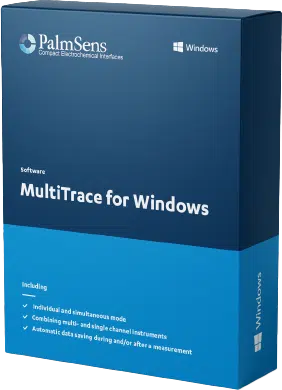
What software is available for your multichannel potentiostats?
PalmSens delivers a multi-channel potentiostat with its own software: MultiTrace for Windows. This software is exclusively meant for our multi-channel potentiostats and is remarkably easy to use.
However, if desired, you can also build your own software to control our multi-channel instruments. Now, there are software development kits (SDK) for MATLAB and .NET. To help you writing your own software, extensive documentation is available on our website.
About softwareWhich electrochemical techniques can I apply with a multichannel potentiostat?
On our product pages you will find an extensive list of techniques supported by our instruments.
It may be that you want to use a technique that is not listed here. Some electrochemical techniques have different names at different potentiostat suppliers. However, you will find the various designations in our cross-reference techniques table. Here you can find alternative names for our electrochemical techniques.
Cross-reference techniquesMulti-channel potentiostat prices
Our multichannel potentiostats are very competitively priced. The MultEmstat4 is the most economical of the two. For the MultiPalmSens4, you largely determine the price yourself with your choice of the desired configuration options.
You can request a price by adding the instrument to the online quotation form. Here you can also add various extensions if you need them. We also sell nearly 100 types of commonly used sensors at competitive prices. So, with one purchase you can get all the equipment to get started besides the chemicals.
PalmSens always sends the requested quotation price within one working day. E-mail us for a quotation or call us to discuss the possibilities for your research with us.
Request a quotationRelated pages
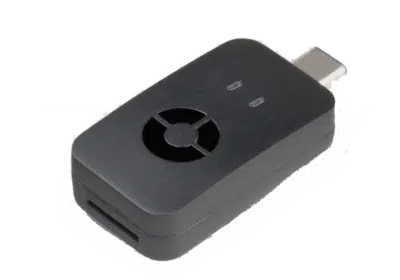
Portable potentiostat
If you want to carry out your measurements in the field and have results available immediately, you may need a portable battery-powered potentiostat and a USB-powered potentiostat.
Read more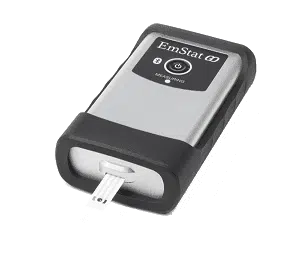
Economical potentiostat
If you want to do electrochemical measurements with a specific purpose in mind, you may need an economically priced potentiostat. PalmSens has several attractively priced instruments for you.
Read more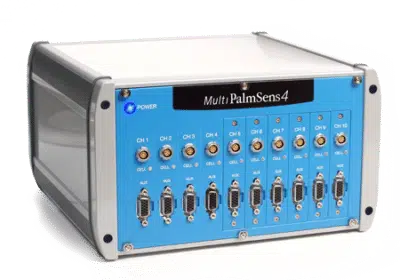
Multi-channel potentiostat
A multi-channel potentiostat allows you to perform multiple experiments at the same time.
Read more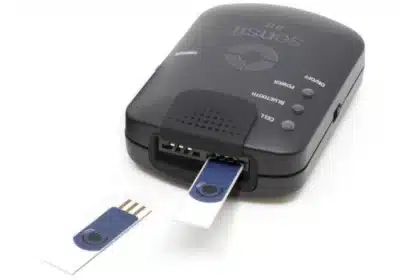
BiPotentiostat
A BiPotentiostat is a potentiostat with two working electrodes, one counter electrode, and one reference electrode.
Read more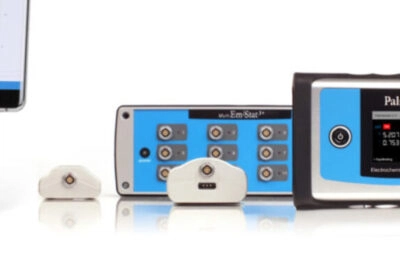
How to choose a potentiostat
The potentiostat’s performance should not limit the results and the software should be user friendly and easy to use.
Read moreDefinition of a Multi-channel Potentiostat
- Multi-channel Potentiostat
- A multi-channel potentiostat is a potentiostat that is capable of running multiple experiments parallel at the same time, in complex experimental situations, to be able to draw a conclusion from a certain experiment or research
Frequently Asked Questions about a multi-channel potentiostat
What is a multi-channel potentiostat used for?
Multi-channel potentiostats are mostly used in electrochemistry in complex experimental situations where many experiments are running in parallel, to be able to draw a conclusion from a certain experiment or research.
- For example, you may need to perform multiple measurements with a long duration, e.g. charge-discharge curves for batteries.
- Also, you may be quantifying multiple analytes with different sensors in a sample solution, e.g. water quality monitoring.
- Finally, you may want to be able to examine multiple samples simultaneously so that you can make rapid progress, e.g. organic coatings on metal alloys for corrosion protection.
Applications for the use of multichannel potentiostats include combinatorial testing, coating analysis, microbial fuel cells, continuous corrosion monitoring, electrode array monitoring, sensor arrays and large-scale supercapacitor for battery evaluation. Feel free to check our literature database for more examples.
Which multi-channel potentiostats does PalmSens provide?
PalmSens has developed two multi-channel potentiostats which both have a galvanostat mode and are capable of FRA/EIS: the MultiPalmSens4 and the MultiEmstat4.
Our multi-channel instruments can controlled by our own MultiTrace software or by your own custom developed software program.


What software is available for your multichannel potentiostats?
PalmSens delivers a multi-channel potentiostat with its own software: MultiTrace for Windows. This software is exclusively meant for our multi-channel potentiostats and is remarkably easy to use.
However, if desired, you can also build your own software to control our multi-channel instruments. Now, there are software development kits (SDK) for MATLAB and .NET. To help you writing your own software, extensive documentation is available on our website.
Which electrochemical techniques can I apply with a multichannel potentiostat?
On our product pages you will find an extensive list of techniques supported by our instruments.
It may be that you want to use a technique that is not listed here. Some electrochemical techniques have different names at different potentiostat suppliers. However, you will find the various designations in our cross-reference techniques table. Here you can find alternative names for our electrochemical techniques.



























